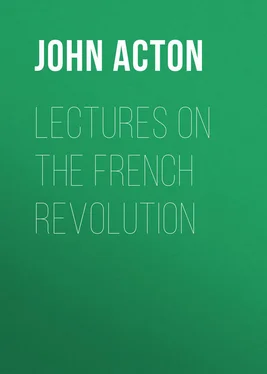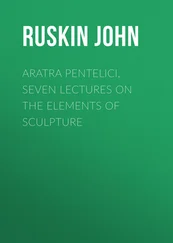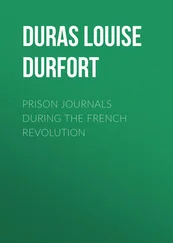John Acton - Lectures on the French Revolution
Здесь есть возможность читать онлайн «John Acton - Lectures on the French Revolution» — ознакомительный отрывок электронной книги совершенно бесплатно, а после прочтения отрывка купить полную версию. В некоторых случаях можно слушать аудио, скачать через торрент в формате fb2 и присутствует краткое содержание. Жанр: foreign_antique, foreign_prose, Историческая проза, на английском языке. Описание произведения, (предисловие) а так же отзывы посетителей доступны на портале библиотеки ЛибКат.
- Название:Lectures on the French Revolution
- Автор:
- Жанр:
- Год:неизвестен
- ISBN:нет данных
- Рейтинг книги:4 / 5. Голосов: 1
-
Избранное:Добавить в избранное
- Отзывы:
-
Ваша оценка:
- 80
- 1
- 2
- 3
- 4
- 5
Lectures on the French Revolution: краткое содержание, описание и аннотация
Предлагаем к чтению аннотацию, описание, краткое содержание или предисловие (зависит от того, что написал сам автор книги «Lectures on the French Revolution»). Если вы не нашли необходимую информацию о книге — напишите в комментариях, мы постараемся отыскать её.
Lectures on the French Revolution — читать онлайн ознакомительный отрывок
Ниже представлен текст книги, разбитый по страницам. Система сохранения места последней прочитанной страницы, позволяет с удобством читать онлайн бесплатно книгу «Lectures on the French Revolution», без необходимости каждый раз заново искать на чём Вы остановились. Поставьте закладку, и сможете в любой момент перейти на страницу, на которой закончили чтение.
Интервал:
Закладка:
In their appeal to the higher law the Americans professed the purest Whiggism, and they claimed that their resistance to the House of Commons and the jurisprudence of Westminster only carried forward the eternal conflict between Whig and Tory. By their closer analysis, and their fearlessness of logical consequences, they transformed the doctrine and modified the party. The uprooted Whig, detached from his parchments and precedents, his leading families and historic conditions, exhibited new qualities; and the era of compromise made way for an era of principle. Whilst French diplomacy traced the long hand of the English opposition in the tea riots at Boston, Chatham and Camden were feeling the influence of Dickinson and Otis, without recognising the difference. It appears in a passage of one of Chatham's speeches, in 1775: "This universal opposition to your arbitrary system of taxation might have been foreseen. It was obvious from the nature of things, and from the nature of man, and, above all, from the confirmed habits of thinking, from the spirit of Whiggism flourishing in America. The spirit which now pervades America is the same which formerly opposed loans, benevolences, and ship-money in this country, is the same spirit which roused all England to action at the Revolution, and which established at a remote era your liberties, on the basis of that grand fundamental maxim of the Constitution, that no subject of England shall be taxed but by his own consent. To maintain this principle is the common cause of the Whigs on the other side of the Atlantic, and on this. It is the alliance of God and Nature, immutable, eternal, fixed as the firmament of heaven. Resistance to your acts was necessary as it was just; and your vain declarations of the omnipotence of parliament, and your imperious doctrines of the necessity of submission will be found equally impotent to convince or enslave your fellow-subjects in America."
The most significant instance of the action of America on Europe is Edmund Burke. We think of him as a man who, in early life, rejected all generalities and abstract propositions, and who became the most strenuous and violent of conservatives. But there is an interval when, as the quarrel with the Colonies went on, Burke was as revolutionary as Washington. The inconsistency is not as flagrant as it seems. He had been brought forward by the party of measured propriety and imperative moderation, of compromise and unfinished thought, who claimed the right of taxing, but refused to employ it. When he urged the differences in every situation and every problem, and shrank from the common denominator and the underlying principle, he fell into step with his friends. As an Irishman, who had married into an Irish Catholic family, it was desirable that he should adopt no theories in America which would unsettle Ireland. He had learnt to teach government by party as an almost sacred dogma, and party forbids revolt as a breach of the laws of the game. His scruples and his protests, and his defiance of theory, were the policy and the precaution of a man conscious of restraints, and not entirely free in the exertion of powers that lifted him far above his tamer surroundings. As the strife sharpened and the Americans made way, Burke was carried along, and developed views which he never utterly abandoned, but which are difficult to reconcile with much that he wrote when the Revolution had spread to France.
In his address to the Colonists he says: "We do not know how to qualify millions of our countrymen, contending with one heart for an admission to privileges which we have ever thought our own happiness and honour, by odious and unworthy names. On the contrary, we highly revere the principles on which you act. We had much rather see you totally independent of this crown and kingdom, than joined to it by so unnatural a conjunction as that of freedom and servitude. We view the establishment of the English Colonies on principles of liberty, as that which is to render this kingdom venerable to future ages. In comparison of this, we regard all the victories and conquests of our warlike ancestors, or of our own times, as barbarous, vulgar distinctions, in which many nations, whom we look upon with little respect or value, have equalled, if not far exceeded us. Those who have and who hold to that foundation of common liberty, whether on this or on your side of the ocean, we consider as the true and the only true Englishmen. Those who depart from it, whether there or here, are attainted, corrupted in blood, and wholly fallen from their original rank and value. They are the real rebels to the fair constitution and just supremacy of England. A long course of war with the administration of this country may be but a prelude to a series of wars and contentions among yourselves, to end at length (as such scenes have too often ended) in a species of humiliating repose, which nothing but the preceding calamities would reconcile to the dispirited few who survived them. We allow that even this evil is worth the risk to men of honour when rational liberty is at stake, as in the present case we confess and lament that it is."
At other times he spoke as follows: – "Nothing less than a convulsion that will shake the globe to its centre can ever restore the European nations to that liberty by which they were once so much distinguished. The Western world was the seat of freedom until another, more Western, was discovered; and that other will probably be its asylum when it is hunted down in every other part. Happy it is that the worst of times may have one refuge still left for humanity. If the Irish resisted King William, they resisted him on the very same principle that the English and Scotch resisted King James. The Irish Catholics must have been the very worst and the most truly unnatural of rebels, if they had not supported a prince whom they had seen attacked, not for any designs against their religion or their liberties, but for an extreme partiality for their sect. Princes otherwise meritorious have violated the liberties of the people, and have been lawfully deposed for such violation. I know no human being exempt from the law. I consider Parliament as the proper judge of kings, and it is necessary that they should be amenable to it. There is no such thing as governing the whole body of the people contrary to their inclination. Whenever they have a feeling they commonly are in the right. Christ appeared in sympathy with the lowest of the people, and thereby made it a firm and ruling principle that their welfare was the object of all government.
"In all forms of government the people is the true legislator. The remote and efficient cause is the consent of the people, either actual or implied, and such consent is absolutely essential to its validity. Whiggism did not consist in the support of the power of Parliament or of any other power, but of the rights of the people. If Parliament should become an instrument in invading them, it was no better in any respect, and much worse in some, than any other instrument of arbitrary power. They who call upon you to belong wholly to the people are those who wish you to belong to your proper home, to the sphere of your duty, to the post of your honour. Let the Commons in Parliament assembled be one and the same thing with the Commons at large. I see no other way for the preservation of a decent attention to public interest in the representatives, but the interposition of the body of the people itself, whenever, it shall appear by some flagrant and notorious act, by some capital innovation, that those representatives are going to overleap the fences of the law and to introduce an arbitrary power. This interposition is a most unpleasant remedy; but if it be a legal remedy, it is intended on some occasion to be used – to be used then only when it is evident that nothing else can hold the Constitution to its true principles. It is not in Parliament alone that the remedy for parliamentary disorders can be completed; hardly, indeed, can it begin there. A popular origin cannot therefore be the characteristic distinction of a popular representative. This belongs equally to all parts of government, and in all forms. The virtue, spirit, and essence of a House of Commons consists in its being the express image of the feelings of the nation. It was not instituted to be a control upon the people. It was designed as a control for the people. Privilege of the crown and privilege of Parliament are only privilege so long as they are exercised for the benefit of the people. The voice of the people is a voice that is to be heard, and not the votes and resolutions of the House of Commons. He would preserve thoroughly every privilege of the people, because it is a privilege known and written in the law of the land; and he would support it, not against the crown or the aristocratic party only, but against the representatives of the people themselves. This was not a government of balances. It would be a strange thing if two hundred peers should have it in their power to defeat by their negative what had been done by the people of England. I have taken my part in political connections and political quarrels for the purpose of advancing justice and the dominion of reason, and I hope I shall never prefer the means, or any feelings growing out of the use of those means, to the great and substantial end itself. Legislators can do what lawyers can not, for they have no other rules to bind them but the great principles of reason and equity and the general sense of mankind. All human laws are, properly speaking, only declaratory; they may alter the mode and application, but have no power over the substance, of original justice. A conservation and secure enjoyment of our natural rights is the great and ultimate purpose of civil society.
Читать дальшеИнтервал:
Закладка:
Похожие книги на «Lectures on the French Revolution»
Представляем Вашему вниманию похожие книги на «Lectures on the French Revolution» списком для выбора. Мы отобрали схожую по названию и смыслу литературу в надежде предоставить читателям больше вариантов отыскать новые, интересные, ещё непрочитанные произведения.
Обсуждение, отзывы о книге «Lectures on the French Revolution» и просто собственные мнения читателей. Оставьте ваши комментарии, напишите, что Вы думаете о произведении, его смысле или главных героях. Укажите что конкретно понравилось, а что нет, и почему Вы так считаете.












